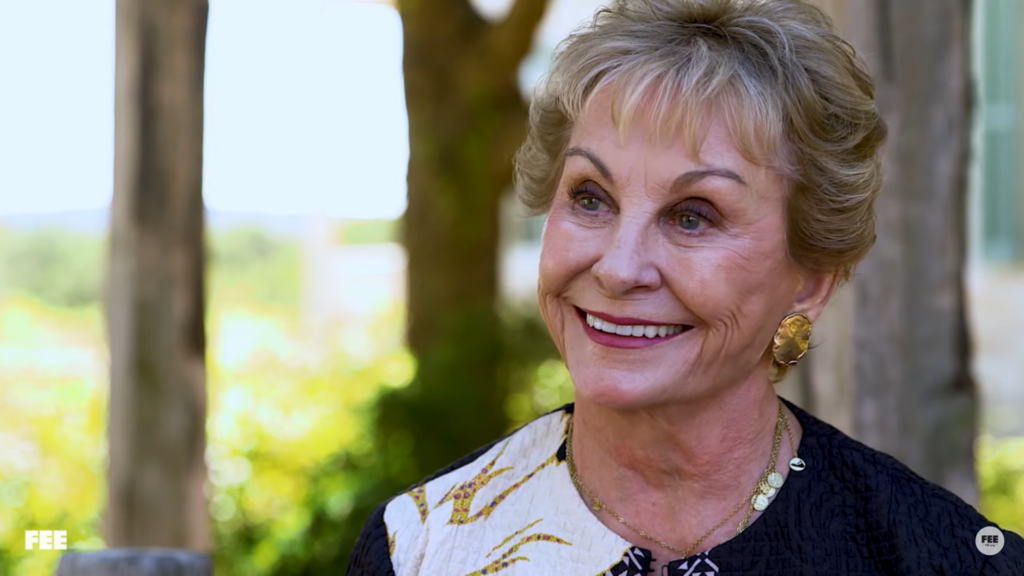The Foundation for Economic Education recently released a short film about the life and philanthropy of Dian Graves Owen. Hers is story of grit and hard work, culminating in exemplary philanthropy.
Complaining about the news is a well-worn, bipartisan pastime. We may disagree on what constitutes “bad news,” but everyone can agree there’s way too much of it these days. And yet the Internet Age is a golden one for “feel-good news” too: an unending torrent of uplifting anecdotes, videos, and quotes awaits our click-through.
In such a climate, inspirational stories can begin to seem suspect—a distraction, drained of any moral content, serving up a quick hit of opium to the online masses. We’ve all laughed, as well we should, at mock-inspirational memes and headlines. Stories of heroic achievement or self-transformation start to seem commonplace.
But with such cynicism we might be shortchanging ourselves of the possibility of real moral edification. As Frederick Douglass once argued, in a lecture entitled “Self-Made Men,” stories of hard-won entrepreneurial success aren’t simply ‘feel-good’: “There is genuine heroism,” he writes, “in his struggle and something of sublimity and glory in his triumph. Every instance of such success is an example and a help to humanity.”
The example of a person who has overcome great hardships and prospered “dignifies labor, honors application, lessens pain and depression, dispels gloom from the brow of the destitute and weariness from the heart of him about to faint, and enables man to take hold of the roughest and flintiest hardships incident to the battle of life, with a lighter heart, with higher hopes and a larger courage.”
Something similar might be said about philanthropy: like the successful entrepreneur, the activity of the philanthropist also honors hard work and attests to a spirit of hopefulness. These two strands—the entrepreneurial and the philanthropic—merge in the career of Dian Graves Stai, recently captured in The Spirit of Generosity, the latest installation in How We Thrive, a short-film series put out by the Foundation for Economic Education.
Her story is a remarkable one. The Spirit of Generosity traces her ascent from working-class single mother to co-founder of Owen Healthcare, a multi-billion-dollar hospital pharmacy management firm, and chairwoman of the Dian Graves Owen Foundation. It is remarkable not simply because of that ascent but because of the setbacks and tragedies she overcame along the way—most notably the death of her husband and co-founder, Jean Owen, in a plane crash at a precarious moment for their company in 1976. Faced with job loss, tragedy, the prospect of bankruptcy, and pressure to sell her company, Stai responded resolutely—willing to wager on her own abilities, judgment, and hopeful disposition.
What makes her story particularly worthy of contemplation, moreover, is how her work ethic and good business sense were likewise infused with the titular “spirit of generosity” that lifted not just her fortunes but those of others around her. Shortly before selling Owen Healthcare, for instance, she converted 25% of the company into an Employee Stock Ownership Program (ESOP), making millionaires of many of its rank-and-file employees.
Through the Dian Graves Owen Foundation, Stai has directed over a hundred million dollars to a diverse range of recipients in her local community of Abilene, Texas, and around the country. As the foundation now boasts over $180 million in assets—fueled by the success of Stai’s second company, Mansefeldt Investments—it is poised to give hundreds of millions more.
In his “Self-Made Men” lecture, Douglass defines self-made men as those who “under peculiar difficulties and without the ordinary helps of favoring circumstances, have attained knowledge, usefulness, power and position and have learned from themselves the best uses to which life can be put in this world, and in the exercises of these uses to build up worthy character.” Purposeful striving, and through it worthy character: The Spirit of Generosity offers an example of both in Stai’s entrepreneurial and philanthropic successes.
Such stories are especially important today, as setbacks, “peculiar difficulties,” and, yes, bad news become the new normal. They encourage us to respond to hardship with hope and to others with generosity. Now is a time for philanthropists not to become more risk averse, but rather to exemplify hope, determination, and generosity for their communities. In this sense, The Spirit of Generosity is far more timely than any of today’s up-to-the-minute crisis-mongering on The Paper of Record—and more truly informative too.




What an amazing person, and a well-written article. Thank you. Now I’ll be researching the film.